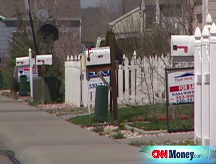Home prices see another record plunge
10 major markets have seen home values fall 17.7% over the past 12 months, and experts expect the declines to continue.

| 30 yr fixed | 3.80% |
| 15 yr fixed | 3.20% |
| 5/1 ARM | 3.84% |
| 30 yr refi | 3.82% |
| 15 yr refi | 3.20% |
NEW YORK (CNNMoney.com) -- Home prices fell in August for the 25th consecutive month and prices in 10 major markets plunged a record 17.7% year over year, according to a key index of real estate values released Tuesday.
The S&P Case-Shiller Home Price 10-city index dropped 1.1% for the month.
The 20-city index recorded a record year-over-year decline of 16.6% with a 1% fall in August.
"It's Economics 101," said Jared Bernstein, senior economist with the Economic Policy Institute. "You have a huge speculative bubble leading to a severe inventory overhang. And now home prices will have to decline accordingly."
That inventory overhang includes many vacant homes. The U.S. Census Bureau reported on Tuesday that the number of vacant homes on the market held steady in the third quarter, at about 2.8% of all housing. That's 65% higher than the long-term historic rate of 1.7%, and represents an excess inventory of nearly a million homes.
This number is critical to home price trends since owners of vacant properties - especially banks - will slash their prices to get deals done. That pushes prices down even more.
The Case-Shiller indexes compare the sale prices of the same homes each year to determine price trends and are considered one of the most accurate home price gauges.
The hardest hit of all 20 cities on a year-over-year basis was Phoenix, where prices plummeted 30.7% during the past 12 months. Las Vegas prices plunged 30.6% and Miami sank 28.1%.
The cities that held up the best were Dallas, which saw a decline of just -2.7%, Charlotte NC (down -2.8%) and Boston (off -4.7%). No city showed a price gain during the last 12 months.
In August, San Francisco saw the biggest price declines, down 3.5%. Phoenix (-2.9) and Las Vegas (-2.4) also reported sizable losses for the month. Two cities showed gains in August; Cleveland prices rose 1.1% and Boston prices inched up 0.1%.
Of course, the August indexes don't reflect the financial market meltdown that hit in September and severely restricted access to credit, according to Richard DeKaser, chief economist for National City Corp (NCC, Fortune 500). He believes the pace of price declines has picked up since then.
"There are two explanations for these steeper declines," he said, "neither of which are encouraging. One is that the difficulty in obtaining credit has further constricted demand. The second is that home sellers are finally capitulating on prices. They've been holding out for months, refusing to sell except at their prices. Now they're throwing in the towel."
Bernstein agrees. "Buyers and sellers have been staring at each other to see who blinks," he said. "Sellers may be blinking first."
That is reflected in existing home sales volume, which ramped up 5% in September as prices fell. Even new home sales went up slightly in September.
Much of that statistical trend is being driven by data from hard-hit western states like California. The California Association of Realtors reported last week that home sales volume jumped a whopping 97% in September compared with the same period a year ago. But the median price of an existing home has fallen 41%.
If that trend spreads to other states, price weakness could last for many more months, even as sales volume picks up. What happens after that largely depends on the confidence bolstering effect of the government economic stimulus packages, according to DeKaser.
"I'm optimistic," he said. "More credit will be available and housing inventories will be reduced. The deterioration will give way to a more balanced market."
But not everyone agrees that the stimulus packages, which are designed to loosen up tight credit, will prove helpful. Peter Schiff, president of broker-dealer Euro Pacific Capital, believes the impact will be decidedly negative.
"The goal of all these plans is to give consumers more money to spend. However, excess consumer spending is part of the problem, not part of the solution" he said. "After a decade-long spending orgy, market forces are finally trying to restrict consumer spending and dampen credit. But the stimulus looks to provide a new source of funds after savings, income, and credit have been exhausted. Our imbalanced economy is in desperate need of retrenchment, but stimulus plans will effectively hold the firemen at bay while throwing gasoline on the flames."
Schiff explained that the housing boom's exotic mortgages, which let people buy homes with zero money down, have vanished. Now people must save to afford a home. But easy credit means people will buy more consumer goods and save less to put towards housing. As a result, he expects home prices to fall a lot more.
"They'll surrender all the gains they made in the past 10 years," he said, "and be even lower than they were 10 years ago." ![]()



